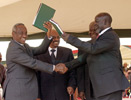
The Financial Times recently reported that Jarch Capital, an investment firm led by financier Philip Heilberg (which includes several former United States government officials on its board of directors) has leased a jaw-dropping 4,000 square kilometers of arable land—approximately the size of Dubai—in southern Sudan. The F.T. provided further comment in an editorial entitled “Rhodes Redux,” noting the “deal depends as much on control exerted by Paulino Matip, the warlord whose son’s company claims rights to some of the land, as it does on legal title.”
Matip is currently second-in-command of the armed forces of Southern Sudan, but until recently led a breakaway faction that had fought on both sides in the North-South conflict. In fact, Matip did not even join the Sudan People’s Liberation Movement and enter into the Comprehensive Peace Agreement until January 2006, a year after it was signed.
Heilberg defends his choice of business partners by saying, “You have to go to the guns, this is Africa,” but it is hard to see the investment as helpful to the already wobbly peace process. As Edward Thomas’ recent Chatham House report notes: “plans for a National Land Commission have not progressed,” and the CPA’s “vague promise to establish a process to resolve the issue of land ownership has gone nowhere.” Instead of investing in the institutions that might actually bring peace to Sudan, Jarch is handing its money to a spoiler, trusting that even if peace turns to war, Matip will have the firepower to guarantee its investment.
It’s a bold, if darkly cynical, strategy. As Heilberg puts it: “If you bet right on the shifting of sovereignty then you are on the ground floor.” But what makes this deal more significant is the makeup of the rest of Jarch’s management team, which includes some heavy hitters, both Republican and Democratic, from U.S. political circles. More on this as it unfolds.

